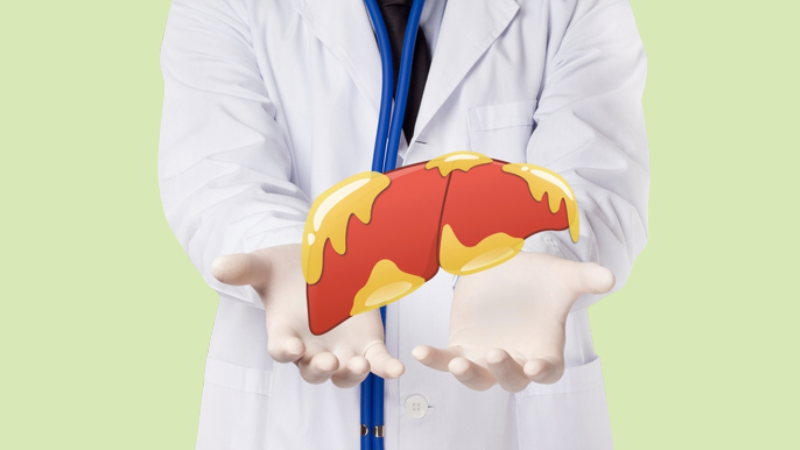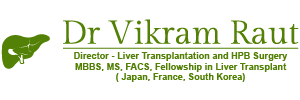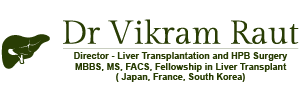
Fatty Liver Disease: Causes, Symptoms, and Treatment
The treatment options for fatty liver disease typically include a combination of lifestyle modifications, dietary changes, and medical interventions. Dr. Vikram Raut provides in-depth knowledge, guidance, and fatty liver disease Treatment in Navi Mumbai.
What is Fatty Liver Disease?
Fatty liver disease, also known as hepatic steatosis, is a condition characterized by the accumulation of excess fat in the liver. Bile is produced by the liver and aids in fat digestion. When the liver cannot properly break down fats, fat accumulates in the liver cells, leading to fatty liver disease.
It's a widespread condition that affects many people globally and can cause significant health issues if not addressed.
Types of Fatty Liver Disease
There are two types of fatty liver disease:
Nonalcoholic Fatty Liver Disease (NAFLD)
NAFLD occurs in people who do not consume alcohol. NAFLD is the most common type, affecting approximately 25% of the world's population.
Alcoholic Fatty Liver Disease (AFLD)
AFLD occurs in people who consume excessive alcohol. AFLD is less common than NAFLD but is still a significant health concern, particularly in heavy drinker.
Causes of Fatty Liver Disease
- Obesity: People who are overweight or obese are more likely to develop fatty liver disease.
- Type 2 Diabetes: People with type 2 diabetes are at a higher risk.
- High Cholesterol
Symptoms of Fatty Liver Disease
- Fatigue: People may experience fatigue and lack energy.
- Abdominal Pain: Abdominal pain is a common symptom.
- Enlarged Liver: In some cases, the liver may become enlarged due to fat accumulation.
- Jaundice: Jaundice is a rare symptom but may occur in severe cases.
Diagnosis of Fatty Liver Disease
- Diagnosis involves several methods such as blood tests, imaging tests, and liver biopsy.
- Blood tests can detect elevated liver enzymes, which may indicate liver damage.
- Imaging tests such as ultrasound, CT scans, or MRI can provide visual information about the amount of fat in the liver.
- A liver biopsy involves taking a small sample of liver tissue for microscopic examination to confirm the presence of fatty liver disease.
Fatty Liver Disease Treatment
There is no cure for this disease, but there are treatments that can help to manage the condition and prevent it from getting worse. Treatment for fatty liver disease usually involves:
- Losing weight: The most important thing you can do to improve your liver health is to lose weight. Losing even a small amount of weight if you are overweight or obese can help reduce the amount of fat in your liver.
- Consuming a nutritious diet: A nutritious diet should be low in saturated fat, trans fat, and cholesterol. It should also contain plenty of fruits, vegetables, and whole grains.
- Regular exercise: Exercise helps reduce the amount of fat in your liver and improve your overall health.
- Avoiding alcohol: If you have AFLD, you should avoid drinking alcohol.
- Medications: Your doctor may sometimes prescribe medications to help manage your fatty liver disease. These medications may aid in reducing inflammation, improving liver function, or preventing disease progression.
- Surgery: Surgery may be necessary in severe cases of fatty liver disease, such as liver transplantation.
How Long to Cure Fatty Liver ?
Fatty liver can be reversed in as little as six weeks on average. An otherwise healthy person can sometimes achieve a complete reversal of fatty liver in less than two months. Alcoholic hepatitis, which develops from alcoholic fatty liver disease, is reversible if you stop drinking alcohol for good. The severity of your alcoholism will determine the length of your recovery.
Fatty Liver Diet:
The treatment of fatty liver disease often involves making dietary changes to support liver health. Here are some key aspects of a fatty liver treatment diet:
- Limit your intake of saturated fats found in fatty meats, full-fat dairy products, and fried foods.
- Avoid trans fats, which are commonly found in processed snacks and baked goods. Instead, choose healthier fats like those found in avocados, nuts, and olive oil.
- Include plenty of fiber-rich foods in your diet, such as fruits, vegetables, whole grains, and legumes. Fiber helps in digestion and can contribute to weight management.
- Opt for lean sources of protein, such as skinless poultry, fish, tofu, and legumes. These options provide necessary protein without excessive fat.
- Minimize your consumption of sugary beverages, candies, pastries, and sweetened cereals. Added sugars can contribute to liver damage and weight gain.
- Avoid overeating. Controlling portion sizes can help manage weight and reduce the strain on your liver.
- Drink an adequate amount of water throughout the day. Staying hydrated supports overall health and helps with liver function.
- Avoid alcohol
Remember, it's important to consult with a healthcare professional or a registered dietitian who can provide personalized guidance and create a specific diet plan tailored to your needs and condition. They can monitor your progress and make any necessary adjustments to your Fatty Liver Disease Treatment diet.


 WhatsApp
WhatsApp